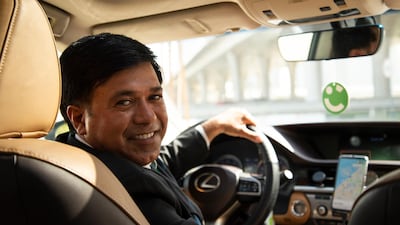Careem’s drivers are “in grave danger of losing everything”, the ride-hailing company's chief executive wrote in an open letter that appealed to governments, potential employers, lenders and individuals to offer a lifeline amid economic hardship linked to the Covid-19 pandemic.
"The state of the business is evident by looking at the streets," Mudassir Sheikha, the chief executive and co-founder told The National.
Across the 13 countries where Careem operates, the company estimates that 500,000 of its 1.3 million registered ‘captains’, what it calls drivers, earn a full-time living from the job, based on data from its platform.
Those half a million people are seeing their earnings dwindle amid stay-home orders as governments seek to contain the coronavirus pandemic. Careem estimates each captain needs about $500 (Dh1836) a month to make ends meet - or a total of $250 million per month to keep every full-time captain in need afloat.
This represents “a fairly large financial gap that no single company can handle on its own”, Mr Sheikha said. He and other Careem executives have foregone their salaries for the year to support drivers. The company declined to disclose the sum.
The appeal echoes parent company Uber’s chief executive Dara Khosrowshahi, who last week asked US President Donald Trump to include gig workers in relief measures.
Uber, which acquired Careem for $3.1 billion last year, has fought in several jurisdictions to keep its workers classified as contractors, avoiding expenses like health insurance and paid time off. Still, Mr Khosrowshahi asked the Trump administration and Congress to consider changing labour laws to provide a “third way” to classify workers “to remove the forced choice between flexibility and protection”.
His request was heeded. The US government included financial assistance to gig workers, including Uber employees, in its historic $2 trillion economic relief package. Under the provisions, they can apply for unemployment benefits and are eligible for a weekly stipend in federal support for up to four months.
The safety net Careem is attempting to provide to drivers will be more piecemeal, given the diversity of nations where it operates. Mr Sheikha asked governments in the Middle East, North Africa and Pakistan to include gig economy workers in their economic relief plans and consider how they may play a role in public health efforts.
It also appealed to lenders to consider how they might offer temporary relief to those with car or home loans. Careem itself is looking for ways to shore up lost income for its drivers.
“There is a big push from our side,” Mr Sheikha said.
Its tech team of 500 people - spread across Berlin, Egypt, Dubai, Karachi and Lahore - are working to roll out services that are relevant to the current moment.
If anything, the current crisis has hastened the development of new products at Careem to meet new, pent-up demand for grocery and e-commerce deliveries as people adjust to life indoors for the time being. Ride-hailing drivers in Saudi Arabia and Jordan recently woke up to an app update allowing them to opt into becoming delivery drivers. Some have become pickers at grocery stores.
The company also sees potential in more government partnerships.
Careem is working with health ministries across its service areas to expand pharmaceuticals delivery services.
The ‘Essentials’ offering, made available in Jordan in recent days, is another example. Users can order groceries and medicines by sending notes to captains and identifying the shop and home where it should be delivered.
Careem is also in talks to be the transport service of choice for clinicians to deliver immunisations at homes when a Covid-19 vaccine becomes widely available, according to a Careem spokesman.
In January, Mr Sheikha outlined a $50 million expansion strategy to The National, with plans to debut more delivery and financial services this year through a "super app".
The app, meant to come out this summer, will be ready in the next few weeks in the UAE, Saudi Arabia and Jordan. From the app, users will be able to do a host of things: book rides, schedule grocery or food deliveries, top up prepaid phones, pay utility bills and initiate peer-to-peer payments.
As for the future of the gig economy, whose vulnerabilities have been exposed in recent months, Mr Sheikha acknowledged “the short-term is very painful”.
With “the offline world” off limits these days, he predicted this will make for a more digitally-savvy population in the long-term. This will be a good thing, he said, for both Careem and its captains.



